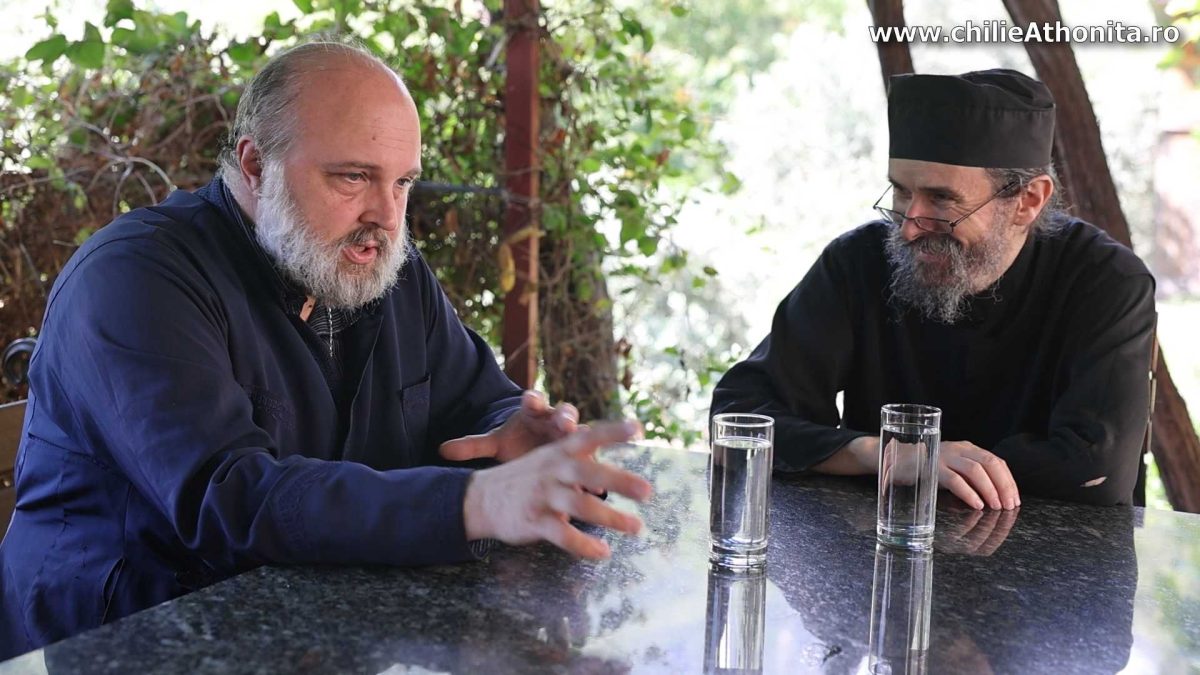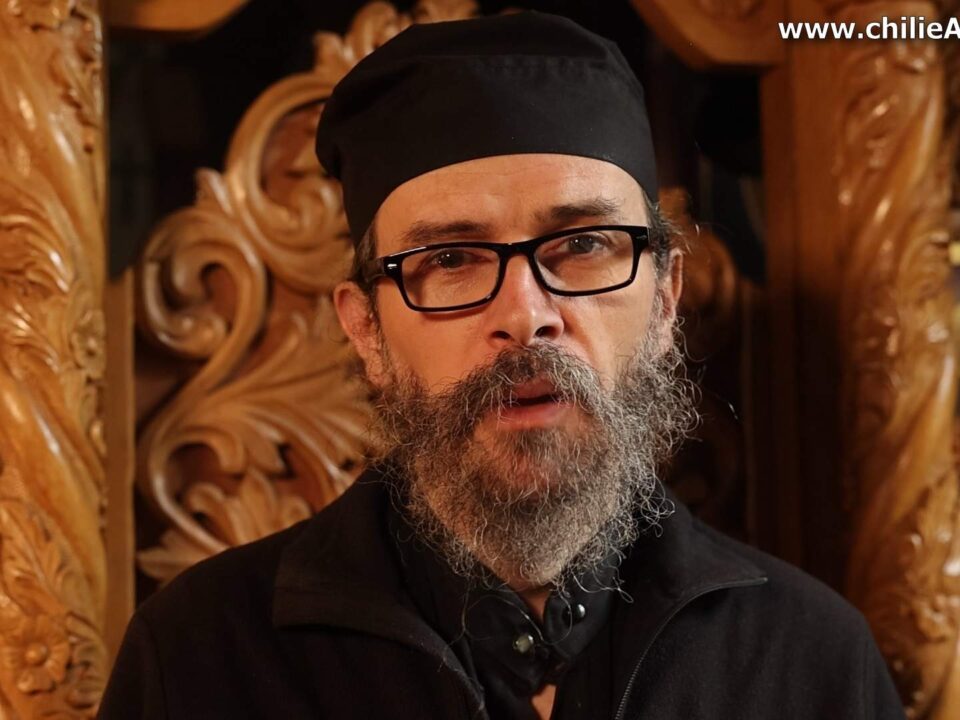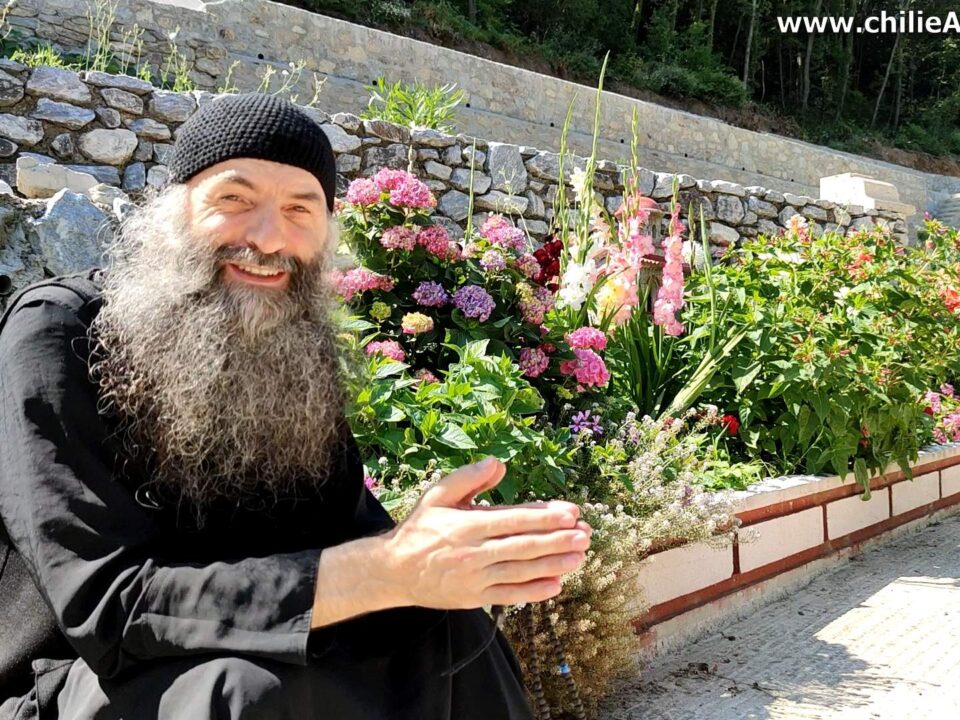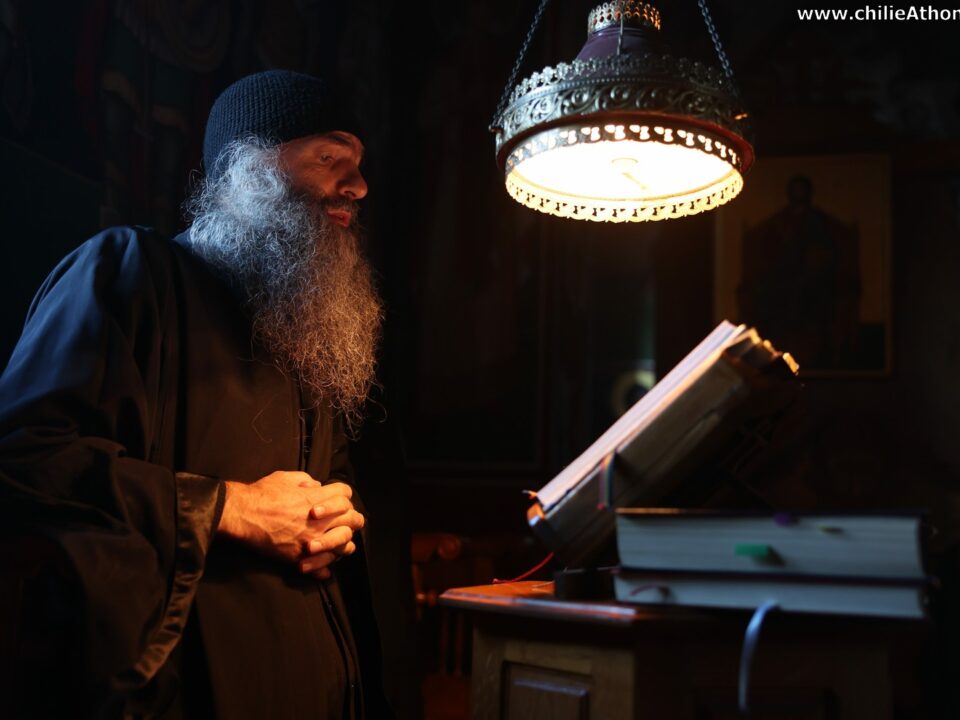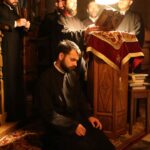
The Passions: Categories, Examples – Father Theologos
21 June 2022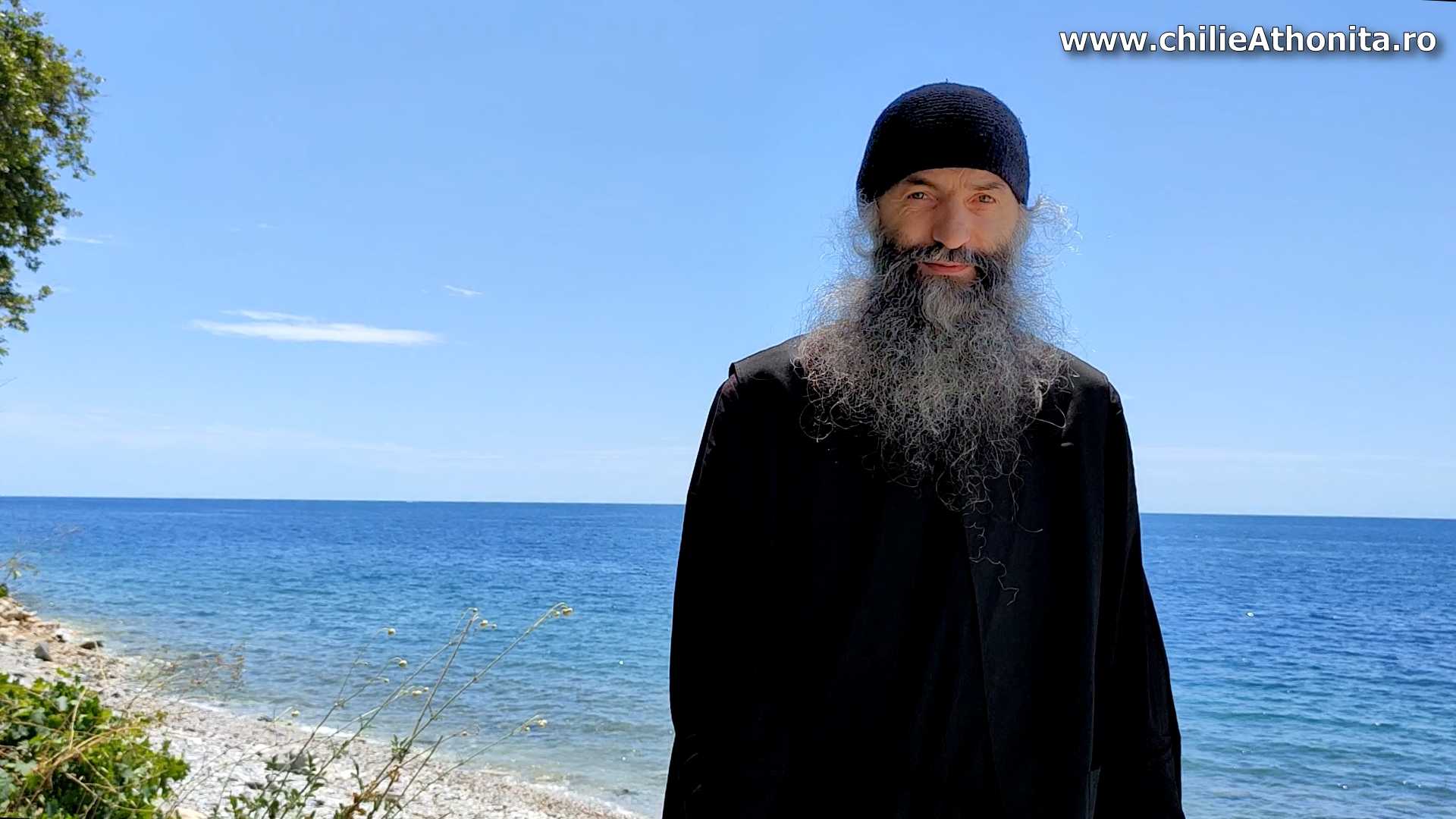
Tourist and Spiritual Guide; Miracles – Father Pimen Vlad
30 June 2022Watch a dialogue between Father Ioan Istrati and Father Theologos about some of the most interesting topics in Romanian Orthodoxy today: the problems of online mission work, the mystery of the Holy Mountain and the attitude towards contemporary Romanian Saints.
Enjoy!
Heavenly King, Comforter, Spirit of Truth, Who art everywhere and fills all things, the Vicar of goodness and Giver of life, come and dwell in us, and cleanse us from all uncleanness, and save our souls, O Good One. Amen.
Father Teologos: Dear friends, we have with us Father Ioan Istrati and I would like to introduce him to you. But I don’t present it to you, and not out of disrespect for His Holiness, but for a much more serious reason: that – I don’t want to judge people – you generally don’t have time to listen to presentations. On the net, in the online environment, unfortunately, there is no more patience. Father Ioan, could you say something on this subject?
Pr. Ioan Istrati: Yes, people have no patience at all and if you put a one line text, everyone reads it. If you post a one-page text, I just like it. If you put up a whole sermon, no one watches – only those who have too much common sense, but they don’t read, but just give a like. And then it’s good to compress the message also because time has become shorter and people don’t have time anymore, but also because we have to extract the essential of the message. And then we adapt to the times.
There was a time when a man had a book in his house. He’d give a pair of oxen to have it. He read it all his life and changed his life after it. Today, we have millions of books on the internet and in libraries, libraries sit empty or unread, and we want it fast, all at the ready, in a second. And that’s a problem.
Father Teologos: Yes. And don’t you think that makes people stop thinking?
Pr. Ioan Istrati: Yes. Humanity, in my opinion, has suffered a crass, chronic involution in the last 30 years thanks to these very accessible, encyclopedic, firepower-intensive, quantity-intensive, but not sinking deep means. That is, wisdom without hard work, without changing life, without living the idea itself. And then we are also people of the times, but we try to keep up as best we can.
Father Teologos: Yes. And I think there’s a big problem here as you said, with the depth of the message. And so I think the Church should maintain the depth of its message, but change the form somewhat, don’t you think?
Pr. Ioan Istrati: That’s right, exactly. You are absolutely right. The Holy Fathers, Saint Maxim the Confessor, for example, is no longer understood by almost anyone, sometimes not even by priests and theologians, because it was too profound. On the other hand, acting only in murky and very shallow waters is not of Christ. For example, we must not fall into the temptation to become sentimental, sweet, sugary, maudlin, tearful, pious and (temptation) to stimulate only this immediate emotional side. The man (says) “oh, how nice!” and the second he forgot. But the word that changes, the word that builds, the word that cuts.
You have seen that the Apostle Paul says that he cuts there between the marrow and the bone, that is to say, there in that compartment of the bone where the growth of the bone takes place. That is, the word of God is creative, it is between the bone which means reality and the marrow which means essence and something will be it, that is, the possibility of growth. And he is our inner growth.
But it’s very hard, of course! Here in the Holy Mountain, people speak nicer and deeper, but outside people have reduced their vocabulary to 1000 words. Although our language has more than a million.
And it’s terrible that real words are lost, but also the ideas behind them. As I said, there were people who pondered an apophthegm or an axiom or a patristic maxim for a lifetime…
F. Teologos: From the Pateric, for example.
Pr. Ioan Istrati: From the Pateric. And we, we know a lot, but it goes over us… It’s a second, I told you, this exact electrical stimulation…
F. Teologos: Yes, chemical reaction…
Pr. Ioan Istrati: Of the brain – “oh my, how nice!”, give it a like and it’s gone. And then, the cat, the bodily pleasures, the dishes or the beautiful places that each visited. In fact, it is a human desperation not to remain insignificant, not to remain in vain. Then the man shouts, the man screams. Not here, but in the world, people talk loudly, gesticulate, struggle to attract attention, not to remain…
F. Teologos. They want to become gods, in fact…
Pr. Ioan Istrati: Yes, it’s a self-aggrandizement that’s by the cunning one of course
Father Teologos: That’s right
Pr. Ioan Istrati: And it’s sad that we see this among the church, among people of faith. People are waiting to be stimulated. A very deep sermon doesn’t have the same effect as it did ten years ago. People want something very metaphorical, very applied to their own person and eventually, that stimulates self-conceit, i.e. vanity, pride.
I’ll give you an example: I give, I put a quote in which I praise people, I say how beautiful you are, how wonderful, what a joy, like this. And all – alas, Father, you are an angel…yes, with horns. But if you give the man something harder to eat, i.e. you tell him about his sins, his passions, the evil in him, you have to change, then the man is not so receptive.
In fact, I was just talking to your holiness about the new anti-Christian Christianity – a very meek, pleasure-obsessed, cozy, comfortable, armchair Christianity that doesn’t talk about sins, pats on the head, fathers who say that the essential of the Christian life is not inner change, but realizing that you can’t change! Which is an absolute aberration.
Father Teologos: Of course.
Pr. Ioan Istrati: And then, human beings indulge in their passions and sometimes even priests tacitly accept it. Yes, the man comes with the penny, nice, you pat him on the head, everything’s fine, everything’s perfect, you pat him on the head. That’s the difference between the real church and the others, the simulacra. For example, in Orthodoxy, a Catholic said: hey, you behave with souls as the foresters behave with firewood, you are too hard, you are terrorists of the soul, you cut into the flesh. Yes, I say, yes, well, confession is cauterization, it’s burning, it’s heartbreak…
Father Teologos: Crucifixion
Pr. Ioan Istrati: It is the wellspring of tears, it is the destruction of the inner self full of the lice of sin. If you go like at the Catholics, to give you an example, they don’t judge them, but you go and just beat your chest, “Alas, I have sinned. Don’t do it again”, they comfort you “yeah, poor guy, he sinned, yeah, that’s good, let’s try not to do it again”. If you haven’t banged his head a little against the walls that he has made between himself and God, man will continue to sin and his chance of progress is zero.
Father Teologos: Yeah, yeah… And I think that comes from a certain lack of faith. I mean we have no faith.
Pr. Ioan Istrati: It’s also lack of faith, it’s also lack of knowledge.
Father Teologos: Yes, yes
Pr. Ioan Istrati: We are, I’m very sorry to say, all of us – the Garden of Our Lady, Romania, alas, so and so, heroes, martyrs, but we have little theological knowledge… Now, little by little, and thanks to the means of communication to talk about it too, people are starting to learn. But people didn’t know very many, there were old ladies at my father’s who looked and said – the man came from the altar with the “heat” in a cup, steaming, with hot water that pours like the Holy Spirit, the water of the Holy Spirit, the heat… and they saw him with the cup and they said: oh, Father, drinks a cup of coffee, he’s so tired.
Yes, or when the deacon comes out after the blessing at the beginning of Mass, he comes out and sings there and then stands in front of the icon of the Savior and says: did you see how the bastards threw him out? He’s standing there in front of the door, not letting him in.
Father Teologos: Yes, but the big problem is that they believe these thoughts and if you try to change them, they insist, it’s hard!
Pr. Ioan Istrati: They insist, yes.
Father Teologos: It’s hard, it’s hard.
Pr. Ioan Istrati: Yes and the fact of faith I said is lack of faith. It’s also cowardice and fear. And with us priests, did you notice when a little earthquake came, immediately everyone got scared – oh my! the pandemic is coming, it’s eating us, it’s finishing us… Some raised their hands before they saw the gun. Others have invented all sorts of separations between themselves and God: aberrant plastic spoons, all sorts of oddities…
Father Teologos: Inventions in Orthodoxy…
Pr. Ioan Istrati: Inventions that prove the lack of faith.
F. Teologos: Yes. And I think, in our discussion at least, faith is a leap in the dark. I mean, do what the Holy Fathers tell you and you’ll be fine.
Pr. Ioan I.: Exactly! And we have so many testimonies.
F. Teologos: Yes.
Pr. Ioan Istrati: You see, when Abram was told that he had to sacrifice his child, his heart broke into a thousand pieces, especially since he had been promised thousands of nations as big as the sand of the sea, and yet he accepted. But He, the Holy Spirit, was working. He said: God will take care of the sheep of his sacrifice. So he still had hope. He put his… exactly the leap in the dark.. He put all his hope in Christ, in God, and of course, he also received his son, but St. John Chrysostom says: he sacrificed his son in his heart, and this is the basis of the Holy Mass – to sacrifice bloodlessly.
We enter into the eternal reality of the sacrifice on the cross, unique and Christ sacrifices Himself without blood on the holy altars so that we may receive His Blood and Body. Yes.
Father Teologos: Yes. Unfortunately, it is a reality that for today’s people, I consider to be a foreign, almost alien reality.
Pr. Ioan Istrati: It’s more and more alien and it’s being competed by this whole tsunami of epidermal pleasures, of media that’s just a click away… All hell is just a click away.
F. Teologos: And that comes from the West, in fact, it does not come from Orthodoxy.
Pr. Ioan Istrati: It’s coming, yes, yes. And we threw ourselves because we were also held in communism and so we threw ourselves into the void on the other side.
F. Teologos: Faith in the wrong direction.
Pr. Ioan Istrati: Yes. And it’s hard. But it is also the time of the exceptional. That is, they are people who manage to make others feel faith. And you have seen, there are monks or priests or theologians even…
F. Teologos: Or Romanian saints.
Pr. Ioan Istrati: Or the Romanian saints who, like magnets, can gather people around them and make them feel the fact of faith.
Father Teologos: Yes.
Pr. Ioan Istrati: You were talking about the mission online, in the media. It’s very hard and I’ve often wondered – wouldn’t it have been better if I’d never entered…
F. Teologos: Yes, yes, yes.
Pr. Ioan Istrati: Because now… Well, I also have a chorus of praisers that I don’t encourage, but it’s “oh, Father, it’s wonderful, divine, holy, beautiful”, but there are also those who are always haters, who always comment…
Father Teologos: Yes.
Pr. Ioan Istrati: I always find a loophole, something – “come on, Father, why don’t you stay in church and…?” On the other hand, the church is all of us. If we stay in church we will be alone and God will cast us into eternal loneliness. Whereas if we go out, there how can we, being dumb, but you see it is compensated by the love of God. I was talking to the pastor that a site like Pravosalvie or one that has a million readers a day, you’d have to preach 20 lives to reach the ears of the people who read a site like that one day. So help us God…
Father Teologos: Yes, and I think it validates us. That is, God pushes us in a certain direction. Haters gonna hate.
Pr. Ioan Istrati: Yes, and those who are self-deceived are already self-deceived.
Father Teologos: Already sick at heart.
Pr. Ioan Istrati: Saint Paul who plowed all of Europe with his heart, I think he would have had an account of 100 – 500 million people.
Father Teologos: Yes, yes and on the other hand, I think he would have had his haters too.
Pr. Ioan Istrati: Oh, he had them.
Father Teologos: He had them.
Pr. Ioan Istrati: They would have cut off his head when they were giving block. We are small, we are pygmies compared to St. Paul.
Father Teologos: Of course:
Pr. Ioan Istrati: But the interesting thing is that God has no one to lose, and then He is so humble that He even enters into these means that are sometimes ridiculous or sinful, so to speak. But still, God wants to pull us in even then, with the drop even though there’s so much filth online and so much malice and so much hate and so much lying. There is no more press, for example. The press is all subservient. Now, they are on the other side too. There are all kinds of conspiracists, there are true ecumenists, there are weird syncretists.
Father Teologos: All extremes.
Pr. Ioan Istrati: It’s very hard to find light or truth. Truth is Christ Himself, not just a concept.
Father Teologos: And because of that, I think the truth isn’t that headline that says “here’s the truth! compromising photos”. No. I believe that truth is union with Christ.
Pr. Ioan I.: Yes. Truth is life.
F. Teologos: So to know the truth… Life, life…
Pr. Ioan I.: And it’s a person. F. T.: Yes, a person.
Pr. Ioan I.: A person Who loves you, Who died for you.
F. T.: And so to know the truth we must not read the press, but we must be united with Christ.
Pr. Ioan I.: You have to pray.
F. T.: Pray!
Pr. Ioan I.: And you have to take the Communion.
F. T.: Yeah, yeah… Good.
Pr. Ioan I.: If one says, says – well, Father, I know, I did Theology, so and so and I fail to feel, I will fall into atheism. And I say: Do you have Christ in you? And he says: no. I say: go and confess and take Christ into your heart there! And I say: Christ in you will think for you and with you. He said: oh, yeah. He went to confession, but he was given a heavy canon by a priest… well, he finished it, 200 masses a day! He was doing this…
Father Teologos: Mother of God!
Pr. Ioan Istrati: Yeah, a bit of an exaggerated father. And it came after about a year so he was already spiritually advanced. And I say: eh, now, do you feel Christ? And he says: every day, he’s with me. It says: but Christ hurts. I say: it hurts because there’s so much meanness and filth in you.
F. Teologos: If I’m not mistaken, Christ crucified Himself, I believe? Pr. Ioan I.: Well, yes, it still has the nail holes…
F. Teologos: From the nail, exactly…
Pr. Ioan I.: Once I was sitting in front of the Holy Table, at the Holy Mass, and I said: we are pieces of Christ, we are parts of His body, but we… I say: which part am I? And I say: I think I am the wound; I am the wound that hurts Christ always. We are constantly doing against and we know so much and we are doing nothing and we are constantly lazy and we, the priests, are the ones who keep the wounds open, we keep scratching them to get blood out, to clean this universe and in a way, we are sadists. We stab Christ… We are those centurions who stand and prod Christ.
Father Teologos: Well, the Mass is a conspiracy of criminals.
Pr. Ioan Istrati: Exactly, but it’s for eternal life. And I’m terribly afraid of what we’ll do when we get there. Someone says: You stabbed me all my life and now you say you still love me? And then I don’t know what to say. Lord have mercy! May God give me then, word, Him.
F. Teologos: Yeah, yeah… Who will be in your holiness to give you word.
Pr. Ioan I.: Well, yes, I was talking to Mrs. Zoe Dumitrescu-Bușulenga and she said: Ionuțe – that’s what he called me – what do you mean we’re going to judge the angels? Angels are huge, majestic creatures of sublime craftsmanship, rational…
F. Teologos: Without sin…
Pr. Ioan Istrati: And without sin, exactly. And she says, how shall we, who are worms, judge the angels? And I say: well, we being parts of the body of Christ, cells of His living divine and human organism, I say, we too will participate because He is the judge and we will be with Him…
Father Teologos: We will be Christs… Not by nature, but by grace… Pr. Ioan Istrati: And I say: we are in Him. And then He judges the angels and then we too in a way, a drop…
Father Teologos: United with Him being…
Pr. Ioan Istrati: Yes, and I say – this has been given to us through Holy Communion. The angels see Him, but they do not receive Him…
Father Teologos: They are not sons of God
Pr. Ioan Istrati: Yes, and they have no material means of receiving God Himself who is the wonder of wonders, the mystery of mysteries. Forgive me, I’ve talked too much.
Father Teologos: No, no
Pr. Ioan Istrati: We’d talk, but I said to be just dialogue… You know what? If I talk I don’t get anything, but if I ask I might get something.
Father Teologos: I, for one, this is why ask.
Pr. Ioan Istrati: I wanted to ask you like this: a lot of lay people come to the Holy Mountain and here is a spirit of gentleness, prayer, obedience, humility and innocence. They’re like children, they all enjoy it, they’re so fine, you don’t find that infectious sinfulness at all. Although people here have many temptations, sometimes even greater than on the other side…
Father Teologos: That’s right
Pr. Ioan Istrati: And the lay comes, yes, a man comes. He simply heard, wants to go to the Holy Mountain, spends, diamonitir so and so and when he leaves here, he leaves changed. Yeah so you look at him and he’s already he’s…
F. Teologos: Someone else
Pr. Ioan Istrati: He is someone else, he is penetrated, he is hurt by the noise of the world, he can no longer stand the shouting, the ostentatiousness of the world and then people change their lives. How do you do it? You mean the Holy Mountain, I don’t know…
F. Teologos: Now it’s your holiness’ bad luck that you bumped into me and I can’t answer you. The answer is a mystery, but of course, if they stick to that answer our viewers may not be happy. As I said, it is a mystery, it is a gift of Our Lady and this comes, I believe, from the total dedication of the Holy Mountain Fathers. So the moment we offer ourselves to Christ, totally, Christ also offers Himself totally.
Pr. Ioan Istrati: So… right
Father Teologos: Yes…
Pr. Ioan Istrati: That’s the answer indeed. That there is something of John’s innocence.
F. Teologos: Yes. He didn’t know anything else.
Pr. Ioan I.: Who sat at Our Lady’s breast and listened to the mystical theology she felt when she had God in her. They say that they sit and think, my lord, Matthew, Mark and Luke, who are titans, fail to say what John said, who was a child, he was a young man…
F. Teologos: A semi-illiterate, in fact.
Pr. Ioan Istrati: Yes, and they were fishermen. And when he came to the Last Supper… it is I, it is I who will sell you, and he, poor man, laid his head on Christ’s breast, heard the beating of God’s heart. And then, at that moment, the whole priesthood, the universe, all priests when they are ordained, lay their heads on Christ’s breast on the holy table. So one gesture and it’s so innocent, it’s a quiet joy, it’s nothing ostentatious. So I didn’t find here ….
Father Teologos: Let me teach you…
Pr. Ioan Istrati: “Take it from here because you don’t have a job”
F. Teologos: I didn’t know the expression… Pr. Ioan Istrati: It’s a gypsy song.
Father Teologos: God forbid!
Pr. Ioan Istrati: And there’s that ease and a godlike naturalness of creation. And I think it’s from the Mother of God. I think that’s how she looked at the world.
Father Teologos: Yes. That’s right. And it’s about obedience. In the world, people make all kinds of strategies, and in the world, successful people, smart people are the ones who impose their will. It’s not like that.
Pr. Ioan Istrati: This is God’s will.
Father Teologos: Yes, God’s will and who can listen for God’s sake to the other. I mean, leave mine for someone else. Humility, yes. Let’s leave it, let’s leave it! For peace. Isiah, peace is a very active, very awakening, nyptical state. I t is the state to make evil unworkable.
Pr. Ioan Istrati: Yes, you invalidate it by itself and incessantly.
Father Teologos: Exactly! From the outside it appears that we do nothing, that we are stupid and so on. But it is something very active, very attentive, awakening so that peace remains. And this is our sacrifice for others. Let’s not hurt the man.
Pr. Ioan Istrati: Father Dionysius, the Saint, the Father of Colciu said that we are stupid peasants, we hid here to seek salvation and he says – I ran away from a devil in the world and I ran into ten here…
Father Teologos: That’s right…
Pr. Ioan Istrati: And I was really very impressed, but also ashamed that I, who am an absolute nobody, and all the parents took me to the table in front there, they put me in… oh my, I was… I had no clothes, no hat, nothing, and they were all so nice, so fine and so humble… That we – what’s with this country priest, get out of here… country priest. And this humility is wonderful and I must learn it too, because I know nothing of it.
Father Teologos: Yes, this comes from the awareness that we are those parts of Christ. So the most important part to be – we are not. But the most important part to be, if we are taken out of this body, if it is cut…
Pr. Ioan Istrati: We’re dry in the next second…
Father Teologos: Yes, yes
Pr. Ioan Istrati: Well, in the world, this consciousness of our belonging to Christ is more faded, it is diluted and it is constantly being jammed by all kinds of jamming channels and then it is very difficult to find peace in the world. That’s why the fathers left. That I said you are saved, that Lot was saved in Sodom and Adam was lost in heaven. But the place and the people around it are also very important.
Father Teologos: Yes.
Pr. Ioan Istrati: That he says – he went to the wilderness. In fact, it’s the inner wilderness, that you’ve taken out all your material addiction…
Father Teologos: From the centers of attention…
Pr. Ioan Istrati: That’s right, and you’re no longer stuck. That it says – it hurts when you die, it says the pain is terrible. Well, yes, if you’ve stuck to matter it’s like skinning your body from the matter you’re attached to, and then that’s like a prophecy of hell. But if you don’t have much here, except for the bare necessities… Listen, but here people have nothing, but they have Christ, they have God, everything, a simple cot, a meal…
Father Teologos: A coat and that’s it.
Pr. Ioan Istrati: They don’t have ten coats, they don’t. I said, I’ve got 5-6 reverends, I’ll give them away, but I can only find one fatter one.
F. Teologos: Yes, eh… May the good Lord help!
Pr. Ioan I.: Yes, so I realized that you can have nothing and have everything.
F. Teologos: That’s right.
Pr. Ioan I.: And you can have everything and have nothing if you don’t have God.
Father Teologos: I know some people who are so poor that they have nothing but money.
Pr. Ioan Istrati: Exactly, and that’s the saddest part. It’s full of them, yes… Anyway, it’s very important that prayer is continuous, it’s very important the humility you mentioned and this awareness of belonging to Christ, but I think it’s also important the sap that is extracted from the earth, that we here, we step on the relics of saints, hermits, monks, martyrs. And then, you’re grounded.
Father Teologos: Of course: There is the grace of place.
Pr. Ioan Istrati: Yeah, yeah… The Patriarch once told a story, I hope he doesn’t get upset if he hears it, that he said that he went and took off his shoes and went on the green grass and felt, he said: he felt how the ancestors enter like this and it seems to give you strength and… It was the Metropolitan: he took off his shoes and sat on the green grass. He sat and said: feel the energy, the joy, the peace and the blessing of the ancestors. And the next day, there were about ten monks, they were all barefoot there, they were sitting… Yes, we feel it too.
Father Teologos: That’s right. The man cries. When I heard you talk like that, I was very happy and very sad. Why? Because even in Romania, there are ancestors, there is holiness, but Romanians do not honor their saints and I say to you brothers, straight in the face, take complaint from me…
Pr. Ioan I.: Criminal complaint…
F. Teologos: Yes, criminal, that you do not honor your saints and especially, Romanian saints, contemporary saints with a core, of course, Romanian saints in prisons.
Pr. Ioan Istrati: It’s sad, it’s very sad. And I think there should be a strong campaign, especially from the monasteries, but also from the chiriarchal centers that still have a lot to do, the idea is that the saints of prisons, for example. They are: Valeriu Gafencu, Dimitrie Bejan, all the fathers who spent time in prison, Father Justin spent 16 years in prison. These people are sources of wisdom not only by what they wrote, but by the fact that they now stand and testify about the Romanian people.
Although we don’t study, sometimes we easily adapt to political orders – that they were legionaries or thought to be or we don’t know for sure or we better leave them like that…
F. Teologos: Let’s not disturb
Pr. Ioan I.: Those men died for God and they were full of blood and they became liturgy and we… you saw, other people more soar, more so, but they canonized them.
F. Teologos: Yes, yes
Pr. Ioan I.: The Russians canonized all those who died in camps and prisons for their faith. And we have this reserve… our style, our easy-going style, lest this or that nation get upset or so on… We sit quietly, we sit like this, we sit, we hide, lest… And it’s sad.
F. Teologos: Very sad.
Pr. Ioan I.: You know what the problem is? If you don’t pray to a saint he doesn’t help you.
F. Teologos: Yes.
Pr. Ioan I.: But do you know why? Because he doesn’t force you.
F. Teologos: Yes.
Pr. Ioan I.: He doesn’t force you. Today, it sits weeping and waiting and we as a people are on the verge of missing our vocation to saints and yet the flowering of future saints because of this lack of honor. But with the Greeks, they don’t have much left….
F. Teologos: Well, they didn’t…
Pr. Ioan I.: Only that he hears of Cosma Ethol or of…
Father Teologos: And contemporary Greek saints. They’re the ones I really love…
Pr. Ioan I.: We are an almost apostate people. So 60 years of communism and you have seen, as a procession appears, they jump up and down like hyenas – what the church is looking for, where they are going, why they are staying, what this and that: Have you seen the Greeks, the firemen, the police, the army, everything, litanies, extraordinary procession, and us… all the time: what is the church doing, what is this? Tear down the house! Get off! What should the priest do? Huo!
This rage against God, which unfortunately leads to hell, has been with us since the time of communism. We have lost our noblesse and nobility. Nobles died in prisons…
F. Teologos: In prisons, yes, and they were sanctified.
Pr. Ioan I.: And we have lost our noblesse
F. Teologos: Yes, yeah, yeah
Pr. Ioan I.: And the founder mentality. In our country, churches are supported by the trembling old lady who brings a coin to the altar, not by sponsors who never come.
There was also that joke that says a million met a coin and says: you? I’m an atheist, I don’t believe in… Well, I’ve never seen you in church. The one coin, faithful, was always at church. And then, we lose our vocation as saints by not praising them.
Father Teologos: Yes. And what hurts me very much is that to the Patriarchate’s credit, which of course, of course, well, all things can improve, the Patriarchate is starting to honor Romanian saints in prisons…
Pr. Ioan I.: Yeah, yeah… Did you notice that it’s actually the anniversary year…
F. Teologos: Memorial year and the day of the 40th…
Pr. Ioan I.: This idea of the Patriarch was when he was Metropolitan and he said: my lord, every year, let there be a concentration of theological effort and study about saints, martyrs, priests, all kinds. And it’s a very good idea.
Father Teologos: Yes and beyond that, forgive me, I want to ask you something, because I think things are very serious. So once we see, with all the shortcomings and so on, we see that there is this movement on the part of the Patriarchate, on the other hand, we see that things between the Church of Greece and the Church of Russia are not good at all.
Pr. Ioan I.: Yes, we’re in schism… Let’s say it, yes.
Father Teologos: In schism… The Romanian Church…
Pr. Ioan I.: Stayed on track
F. Teologos: Good and it’s the only point of balance between the two. So I think that people who are now hitting the Patriarch and the Romanian Patriarchate do a…
Pr. Ioan I.: Great sin…
F. Teologos: A great pity, disaster.
Pr. Ioan I.: Well, he’s exactly the ship. That some have recognized a parachurch entity, others justify their actions totally alien to the spirit of the Gospel to say the least, and then the excesses lead…
Perhaps it is also a vocation of the Romanian Patriarchate to unify, to reconcile, to bring peace… God willing!
Father Teologos: Yes. May the good Lord give! Not only that. I see, that is, we know that any community, any nation, any country, even continent, if it is to be reborn, will be reborn only from a spiritual point of view.
Pr. Ioan Istrati: It’s clear that this is where it starts or doesn’t start or goes all the way.
Father Teologos: Well, at this time in Europe, my brothers, I’ve been living in Greece for twenty and I don’t know how many years, the Greeks are finished. Their great advantage is that they have tradition.
Pr. Ioan Istrati: They respect it, but more patriotically so.
Father Teologos: That’s right, patriotic. They have no voice in Europe, nothing, no diaspora. We don’t talk about the Russians because they are what they are…
Pr. Ioan Istrati: Poor things.
Father Teologos: Yes, the poor, indeed. Europe’s only spiritual chance is the Romanian diaspora. And we have a very strong diaspora.
Pr. Ioan I.: It’s good and it’s big.
F. Teologos: It’s big, it’s big.
Pr. Ioan I.: And the brilliant idea was that the Patriarch established dioceses in all these countries.
F. Teologos: Yes, where possible.
Pr. Ioan I.: And then, they do prayers, services, are singing patriotic songs, take the communion. We’re holding very tight. And it’s great, and it’s not a philistine at all.
Father Teologos: No, no, no. Because speaking of Greeks and Russians.
Pr. Ioan I.: Philistine is to believe that Orthodox equals Greek. I never said that. All kinds of Orthodox are also welcome in Romania.
Father Teologos: Of course:
Pr. Ioan Istrati: It is very important. But we have a bit of a peripheral vocation. The fact that we lived on the edge of Europe and that we lived all the time in empires that were criminal and therefore had nothing to do with the spirit of Christ. And then we somehow stayed there hidden in the mountains.
F. Teologos: Complexed…
Pr. Ioan I.: We are the sons of weeping widows and of the dead from the front. Our parents used to sit in the tombs and watch over us, and because of that we have this fear, I think this is where we need to work.
Father Teologos: On fear, yes. Don’t be afraid people. We must export Orthodoxy, we must export spirituality.
Pr. Ioan I.: I haven’t seen any cowardly saints.
F. Teologos: Yes.
Pr. Ioan Istrati: So the saints were so unselfish, very vulnerable in their infinite love, because it was Christ’s in them…
F. Teologos: Saint Dumitru Stăniloae, Saint Cleopas… How much they were… No fear, but a lot of delicacy.
Pr. Ioan Istrati: Or Father Justin. Or Teofil Pârâian.
F. Teologos: That’s right, yes.
Pr. Ioan Istrati: It was a beautiful boldness, childish in an innocent sense, but sometimes they were cutting into living flesh.
F. Teologos: Yes.
Pr. Ioan I.: And I believe that here, this vocation you mentioned, European and perhaps even more so of the Romanians to unite, to unify… We are neither imperialists nor Phanariots…
F. Teologos: Nor Philistine
Pr. Ioan I.: Neither Philistine nor universalists.
F. Teologos: But we must love our country. Necessarily.
Pr. Ioan Istrati: Yes, absolutely. But this fact that we should be a bit bolder and theology is very important. If we are going to stay permanently in this feeling of copying, taking from there, putting… He translated the Philokalia, he made treatises on theology. He studied theology. We have to start doing theology or else we will quote from the Sources chretiennes and from the GP [Greek Patrology – n.n.] and from that and it is very important. On the other hand, translations of the Holy Fathers, yes. A lot has been done since the revolution, but it is still a lot to be done. I think half of the great Fathers are not translated here and that’s a problem.
Father Teologos: So people, folks, be united, don’t be haters, don’t hate, forgive us!
Pr. Ioan Istrati: Forgive out!
Father Teologos: And have courage! And export spirituality. The Romanian had nothing in history but God.
Pr. Ioan Istrati: Missionary through him. Without ostentation, but look, for example, on a bus in Berlin, there were about 20 Romanians. When they passed a church – it was a Catholic church, but never mind – everyone crossed themselves.
F. Teologos: Glory to the Lord!
Pr. Ioan I.: And there were some Germans in the back and they started clapping their hands. Look, they have faith! I don’t care: I am with strangers, but I have not lost my faith, Christ is in me. He was crossing himself. He is the cross.
F. Teologos: Amen! Let the good God help us!
Pr. Ioan Istrati: Kiss the hand. Through the prayers of our holy fathers, Lord Jesus Christ, Son of God, have mercy on us! Amen
Online commemoration lists and donations
May the Lord help us!
Online Commemoration Lists and Donations
May the Lord help us!
If you have a bank card and wish to send commemoration lists and donations online using your card, and/or to support our philanthropic activity, including this site, please fill out the form below to make a small donation. The form is secure – we use Stripe for payment processing – a world leader in this field. We do not collect your personal data.
If you do not have a card, or do not wish to use it, visit the webpage for Online Donations and Commemoration Lists.
We will pray for your loved ones! (Please do not include inessential details like wishes, degree of kinship, introductions etc. JUST the name!)
Especially for recurring commemoration lists, we ask that you please keep them to under 20 names long. If you include a member of the family, we add “and for their families.”


